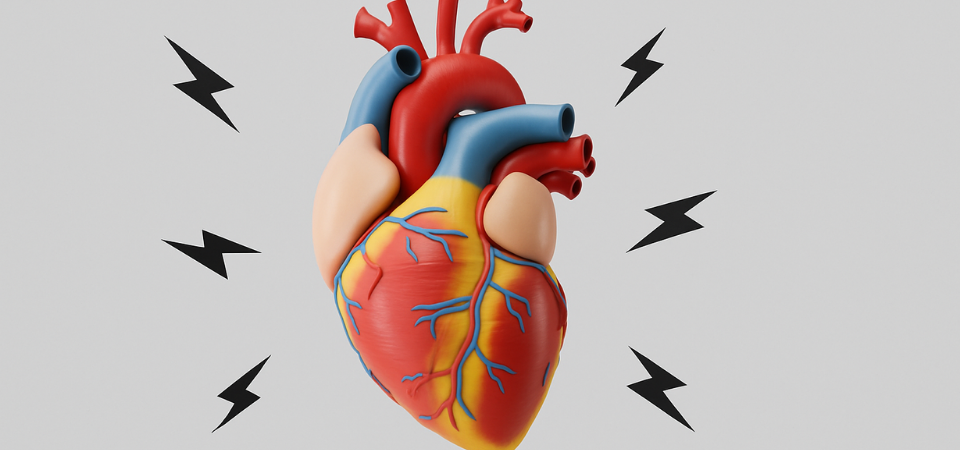How chronic stress damages your heart through connections to your brain

TL;DR
Your heart and brain operate as an integrated system where emotional stress directly weakens heart muscle function, while brain injuries can trigger heart failure. New insights from cardiologists and neurologists reveal that chronic stress hormones like cortisol create a cascade of cardiovascular damage, but understanding this connection opens powerful opportunities for targeted wellness interventions that protect both organs simultaneously.
Why This Matters
This heart-brain connection fundamentally changes how you should approach stress management and cardiovascular health. Rather than treating these as separate concerns, the research shows that protecting your mental health directly strengthens your heart, while supporting cardiovascular function enhances cognitive performance. For wellness-focused individuals, this means your meditation practice, stress management protocols, and emotional regulation strategies aren't just mental health tools—they're essential cardiovascular protection. Understanding these mechanisms allows you to implement targeted interventions that optimize both systems at once, maximizing your health investment.
Key Facts
The stress-heart damage pathway:
- Chronic stress elevates cortisol and adrenaline, which directly raise blood pressure and strain blood vessels over time
- Intense anger episodes can trigger "Broken Heart Syndrome" (Takotsubo cardiomyopathy), temporarily weakening heart muscle function
- Chronic depression and anxiety independently increase heart disease risk through both physiological stress and lifestyle factors
Brain control mechanisms:
- The autonomic nervous system, controlled by brain regions like the hypothalamus and prefrontal cortex, directly regulates heart rate, blood pressure, and blood vessel tone
- Brain injuries can disrupt this control system severely enough to cause heart failure
- Neurodegenerative disorders and depression disrupt hormonal balance, creating inflammatory conditions that damage cardiovascular health
What the Science Shows
Cardiologist perspective on emotional impact:
"As a senior cardiologist, I often tell my patients that the heart and brain are an inseparable pair," explains Dr. Haresh Mehta, consultant cardiologist at P.D. Hinduja Hospital. "Negative emotions like anger and sadness can be a ticking time bomb. Intense episodes of anger can cause a sudden surge in blood pressure and heart rate, sometimes leading to what's known as 'Broken Heart Syndrome.'"
Neurologist insights on brain control:
"The autonomic nervous system is composed of the sympathetic and parasympathetic systems, which, in simple terms, regulate the fight or flight responses, where the heart plays an important role," notes Dr. Kaustubh Mahajan, consultant neurologist. "Key brain regions such as the hypothalamus and prefrontal cortex exert this direct control; injury to any of those can disrupt heart function, even causing heart failure."
The inflammation connection:
Dr. Mehta emphasizes that cortisol doesn't just raise blood pressure—it triggers systemic inflammation that leads to arterial hardening, dramatically increasing risks of heart attacks and strokes. This reveals why chronic stress feels so physically draining: your body is literally under inflammatory attack.
In Plain English: How This Actually Works
Think of your autonomic nervous system as your body's automatic pilot, constantly adjusting heart rate and blood pressure based on what your brain perceives. When you're stressed, your brain's "alarm system" (sympathetic nervous system) tells your heart to pump faster and harder, while stress hormones flood your bloodstream.
In healthy situations, this response helps you handle challenges, then your "calm down" system (parasympathetic nervous system) restores normal function. But chronic stress keeps your alarm system activated, forcing your heart to work overtime while inflammatory hormones damage your blood vessels—like running your car engine in the red zone continuously.
Broken Heart Syndrome demonstrates this connection dramatically: intense emotional trauma can literally stun heart muscle cells, causing symptoms identical to a heart attack but without blocked arteries. Your emotions become so overwhelming that they temporarily disable normal heart function.
The Wellness Angle
This research reveals four critical insights for optimizing both cardiovascular and cognitive health:
1. Stress Management Is Cardiovascular Medicine: Every stress reduction technique—from meditation to breathwork—directly protects your heart by preventing cortisol-induced inflammation and blood vessel damage. This means your mindfulness practice delivers measurable cardiovascular benefits, not just mental clarity.
2. Mental Health Affects Physical Longevity: Depression and anxiety aren't just psychological concerns—they're cardiovascular risk factors comparable to smoking or high cholesterol. Addressing mental health proactively becomes essential for long-term physical health and longevity.
3. Brain Training Strengthens Heart Function: Practices that strengthen prefrontal cortex function—like cognitive training, meditation, and emotional regulation techniques—literally improve your brain's ability to control heart function optimally.
4. Recovery Requires Both Systems: Optimal recovery from physical or mental stress requires supporting both cardiovascular and neurological function simultaneously through targeted nutrition, sleep optimization, and stress management protocols.
What You Can Do
Implement dual-system stress management: Choose stress reduction techniques that benefit both heart and brain function, such as heart rate variability training, which directly improves autonomic nervous system balance.
Support stress hormone regulation: Consider adaptogenic compounds like ashwagandha or rhodiola that help normalize cortisol patterns, protecting both cardiovascular and cognitive function from chronic stress damage.
Optimize autonomic balance: Practice techniques that strengthen parasympathetic (recovery) function, including deep breathing exercises, yoga, or meditation, which directly improve heart rate variability and blood pressure regulation.
Address mental health proactively: Treat depression, anxiety, or chronic stress as cardiovascular risk factors requiring intervention, not just psychological concerns to manage.
Monitor both systems: Track both cardiovascular markers (blood pressure, resting heart rate) and cognitive/emotional indicators (stress levels, sleep quality, mood) as integrated health metrics.
What to Watch
Personalized interventions: Emerging research may reveal how individual genetic variations in stress response and autonomic function can guide customized heart-brain optimization protocols.
Wearable technology integration: Advanced heart rate variability monitoring and stress tracking devices will likely provide real-time feedback on heart-brain connection optimization.
Therapeutic developments: New treatments targeting the autonomic nervous system may offer more precise interventions for both cardiovascular and neurological conditions simultaneously.
Bottom Line
Your heart and brain function as an integrated system where emotional stress directly damages cardiovascular health, while brain function controls heart performance. This connection means that every stress management technique, mental health intervention, and emotional regulation practice delivers dual benefits for both organs. By understanding and supporting this relationship through targeted wellness strategies, you can optimize both cognitive performance and cardiovascular health simultaneously, maximizing your investment in long-term wellness and longevity.



